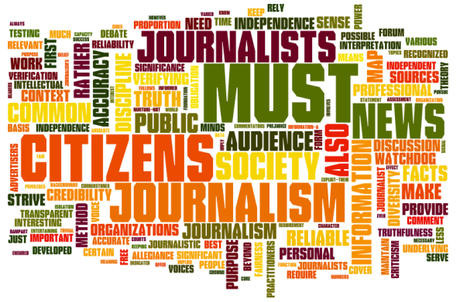
Word cloud of the Pew's principles. The words mentioned most often are the biggest -- notice that citizens are bigger than journalism itself.
“Journalism’s first obligation is to the truth.”
So says the Pew Research Center’s Project for Excellence in Journalism. But the center does not define the word in an absolute or philosophical sense. They mean truth in a practical sense:
“…Journalistic truth is a process that begins with the professional discipline of assembling and verifying facts. Then journalists try to convey a fair and reliable account of their meaning, valid for now, subject to further investigation.”
Although journalistic guidelines vary between nations and media outlets, the Pew Center’s list has really resonated with me. I have penned their guiding principles onto the inside cover of my notebook.
I’m not trying to be cute. If we don’t stick to best practices, we’re likely to do more harm than good. We’re likely to contribute to the problems that we cover instead of helping our fellow citizens access the information they need to understand the important issues of the day.
As the new media landscape continues to change at breakneck speed, we have to get a grip on our values. We won’t always be the first, but we must strive to be the best. Our information should be verified, our sources credible, and our reasons for doing this clear. This is true in any medium.
I’m sorry to sound preachy. I’ve just been feeling a bit disillusioned lately, and I have to remind myself why I’m in this. It’s not for the fame, fortune or the stability … it’s because I took the admittedly cliched advice to be the change I want to see.
The nine principles are as follows:
- Journalism’s first obligation is to the truth
- Its first loyalty is to citizens
- Its essence is a discipline of verification
- Its practitioners must maintain an independence from those they cover
- It must serve as an independent monitor of power
- It must provide a forum for public criticism and compromise
- It must strive to make the significant interesting and relevant
- It must keep the news comprehensive and proportional
- Its practitioners must be allowed to exercise their personal conscience
In the original text, each principle is followed by an explanation, which are all thoughtful, succinct, and well worth a read.
For instance, here’s principle 9:
Every journalist must have a personal sense of ethics and responsibility–a moral compass. Each of us must be willing, if fairness and accuracy require, to voice differences with our colleagues, whether in the newsroom or the executive suite. News organizations do well to nurture this independence by encouraging individuals to speak their minds. This stimulates the intellectual diversity necessary to understand and accurately cover an increasingly diverse society. It is this diversity of minds and voices, not just numbers, that matters.
Personally, I feel that accountability is better enforced when it is embodied. As the mission statement of the Real News Network reads:
“We all have interests. We recognize that bias will affect the elements in a story we choose to highlight, the facts we consider important and the sources we decide to trust. To be human is to have bias. The answer is transparency.”
Whether framing stories with contextual disclaimers, or clarifying our positions in editorials, full disclosure is, I would argue, part of the shift away from top-down unidirectional media. In a media culture that itself overuses the affix –gate, the more upfront we are about our subject position, the better our readers can assess the message they are receiving.
The best journalists I know do this with humility. They examine their own power to influence others, and don’t take their audience’s trust for granted.
But they’re also imperfect people, just like everyone else.
